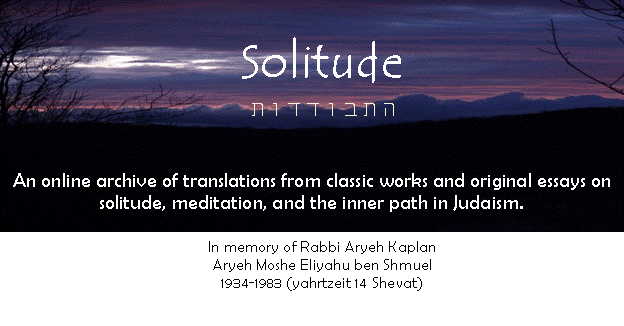From Rabbi Yosef Yitzchak Schneersohn of Lubavitch, Likkutei Dibburim (“An Anthology of Talks”) (Kehot) Vol. I, sec. 26-30 translated by Rabbi Uri Kaploun. (Footnotes have either been incorporated into the text or omitted. We took the liberty of creating our own subtitles for this online version.)
Reaching the GoalOnly a misboded can arrive at a level such as the perfection of haskalah. Only one who of his own accord forgoes mundane matters and harnesses his spiritual faculties and senses to intellectual activity can aspire to the highest perfection of haskalah.
When Moshe Rabbeinu was a shepherd, he was at the highest level that a misboded can attain. And, as we have seen, as soon as he beheld the divine light he said: “I shall turn aside and see"; that is to say, “I shall turn aside from here to come nearer there” -- this being the aspiration of a misboded.
To this he received a reply from Above: “Remove your shoes from your feet.”
True enough, the avodah of a misboded is something lofty -- but there is something higher than it. And that higher level of avodah also contains the kernel of the aspiration, “I shall turn aside from here to come nearer there.” However, in order to arrive at this aspiration as it is experienced at the higher level of avodah, there is a prerequisite, namely, “Remove your shoes from your feet.” This signifies the avodah of being able to divest oneself of the dictates of one's reason, and subjugating oneself to that which transcends reason.
In the above-mentioned passage concerning Moshe Rabbeinu we see his path in avodah. First there is a revelation from Above, in which the Almighty tells him that He is the G-d of Avraham, of Yitzchak, and of Yaakov. Until this point his path has followed the inner direction of hisbodedus; from this point on, a new path in avodah will have to begin. Moshe Rabbeinu does not want to take leave of the world of hisbodedus, nor does he want to encounter the world of hisgalus, of self-revelation. And then a certain amount of bargaining goes on, until the Almighty reveals to him the teaching hidden in the verse, "This is My Name forever, and this is My remembrance from generation to generation."
In other words, G-d reveals to him the secret of beirurim, which is the divine intention underlying the creation of the world -- that the tasks of beirurim can be realized only through the avodah of hisgalus, of self-revelation. And indeed, through the self-revelation of Moshe Rabbeinu we were privileged to be given the Torah -- and through the Torah and its mitzvos, one sifts and refines the world. Likewise, through the self-revelation of the Baal Shem Tov we were granted the revelation of the pnimiyus of the Torah, the innermost levels of the Torah.
That is to say, that through the study of the Torah and the fulfillment of the mitzvos one readies the world in such a way that materiality should become a vessel for G-dliness; and through the pnimiyus of the Torah -- the study of Chassidus, and being occupied with Chassidus -- one draws down the revelation of G-dliness in This World.
The teachings of the Baal Shem Tov thus combine both advantages -- the virtue of hisbodedus and the virtue of hisgalus, for they are a "handle" making possible the revelation of the essential light of hisgalus in such a way that it should find expression in one's intellectual faculties.
